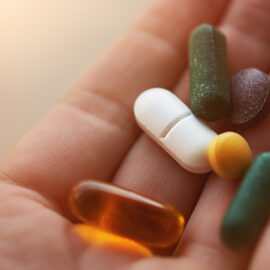Over the last decade, the human gastrointestinal microbiome and its role in health and disease has risen as a research hotspot. In addition to its undeniable connection to the brain and immunity, emerging studies have uncovered the link between gut health and skin health, aptly referred to as the gut-skin axis. Researchers have found that gut dysbiosis, or an imbalance of microorganisms in the intestines, not only alters the skin microbiome, but may also contribute to a variety of skin disorders and diseases.1 This includes acne, psoriasis, rosacea, and atopic dermatitis. To provide patient education on ways to improve skin health through the gut, it’s important for healthcare professionals to understand the role of the skin microbiome, how it is affected by the gut and science-based recommendations that could be beneficial for both areas of the body.
Uncovering the Skin Microbiome
The term “gut-health” has skyrocketed in popularity because of improved scientific understanding of the relationship between digestive health to overall well-being, and an increase in rates of digestive diseases, such as IBS, worldwide.2 While most are familiar with the microbiome in regard to the intestine, the skin microbiome has become an emerging area of research, especially in its relationship to gut health and the immune system. Aside from being the body’s largest organ, the skin is host to millions of microorganisms, including bacteria, fungi, and viruses, that play a similar role to those found in the gut. This includes fending off disease-causing pathogens and aiding immune defenses. As with the gut, maintaining a balanced skin microbiome involves a complex interplay among microorganisms, immune cells, and other factors. Alteration of the skin microbiome, specifically an increase in pathogenic microorganisms and a decrease in beneficial ones, can cause inflammation and changes in the immune system. As a result, conditions such as acne and eczema may occur.3
Gut-Skin Axis: A Look at the Latest Research
The gut-skin axis is a term used for the intricate interaction between the gut and the skin and essentially acts as a two-way street – meaning intestinal health or conditions can impact the skin and vice versa. The gut and skin are uniquely related in purpose and function, especially with both being essential to the maintenance of physiological homeostasis. The integrity of the intestinal barrier, along with the action of intestinal mucus, immune cells, and other factors, prevents the entrance of bacteria into the bloodstream, ultimately maintaining skin homeostasis.4 When intestinal integrity is disrupted, the imbalance of microbes that ensues can ultimately lead to a state of skin disease.5 Considering the varied types of gut symptoms, the skin may be a good measure for determining what may be happening in the gut. Not to mention that the health of the skin barrier, or the outermost later of the skin, plays a direct role in gut health as it protects against bacteria, toxins and other harmful substances which may lead to inflammation which can negatively affect gut health.
While the mechanisms of which the gut microbiome affects skin health are still unclear, advancements toward understanding the skin and gut microbiome may lead to novel ways to treat human skin diseases.
Role of Diet & Probiotics
Ongoing research suggests probiotics have an impact on the composition and metabolic activities of the gut microbiome, which subsequently impacts the skin. Modifying the gut microbiome through dietary changes and ingestion of certain macro- and micro-nutrients significantly influence the composition and diversity of the gut microbiome which could positively impact skin health and prevent related diseases. For example, dietary fiber can help to increase beneficial bacteria, and some micronutrients such as vitamins A, D, and calcium, help to modulate gut microbiota toward a health phenotype by also increase beneficia; bacteria strains, all of which can positively affect skin health.6
Furthermore, using dietary supplements that include probiotics and prebiotics may help reshape the composition of our gut microbiome in the long term. The most common bacteria strains in probiotics supplements includes Bifidobacterium, Lactobacillus, and Streptococcus with Bifidobacterium and Lactobacillus being the two most used strains in human health studies.6 However, the use of probiotics and prebiotics in topical treatments for conditions such as acne and atopic dermatitis remains to be an area of ongoing research and controversy.4
Putting Action into Practice
As interest in digestive health takes center stage, and science behind its relationship to skin health continues to surface, healthcare professionals are well-positioned to educate patients on ways to improve their health through food and nutrition. Here are 3 simple tips to improve gut health, and ultimately, skin health, from gastrointestinal expert dietitian and member of Orgain’s Nutrition Advisory Board, Colleen Webb, MS, RD.
Choose probiotics wisely. Probiotic supplements may help to manage digestive symptoms. Emerging research suggests probiotics might also benefit skin health by improving barrier function, reducing inflammation, balancing its microbiome, and moisturizing. However, not all probiotics are created equal, and different strains have varying effects. Recommendations for probiotics should be based on those that have been well-studied and have shown a benefit to the individual concerns or medical conditions. Gastrointestinal healthcare experts can support in making these recommendations.
Consider a vitamin D supplement. Vitamin D supports the integrity and function of both the gut and skin barriers. Low vitamin D levels have been linked to increased risk of a variety of diseases, including the onset and reactivation of inflammatory bowel disease and psoriasis. A sufficient vitamin D level (measured as 25-hydroxy vitamin D) is considered >30 ng/mL, but many experts aim for >40 ng/mL. Since it can be difficult to adequately meet vitamin D needs with diet alone (e.g. tuna, vitamin D fortified cereals, orange juice and dairy/non-dairy alternatives) a supplement may be recommended. The supplemental dose is typically 500-5,000 IU to correct any deficiencies, with a maintenance dose of 1,000-2,000 IU/day. While vitamin D can also be synthesized from the sun, the amount produced can vary from person to person, not to mention too much sun exposure can damage skin cells.
Increase fiber intake. Eat a wide variety of plants, such as whole grains, fruits, and vegetables. They provide an ample amount of dietary fiber, which aids digestion and promotes regular bowel movements. Good digestion (plus hydration!) eliminates toxins, which is essential for healthy skin. Plus, fiber supports a healthy microbiota, which affects gut and skin health via regulating the immune system. Aiming for 30 unique plants per week is an excellent way to eat more plants.
Eat whole or minimally processed foods. Eat a diet rich in plants, such as fruits and vegetables; healthy fats, like olive oil, avocado and fatty fish; and lean protein sources, including poultry and eggs. This type of dietary pattern (e.g. the Mediterranean diet) is full of antioxidants and anti-inflammatory agents that nourish both gut and skin health.
Stay hydrated. Water is essential for healthy skin and digestion for a variety of reasons. The most noticeable benefits include its ability to protect against dry skin and help to alleviate constipation. Some people can let thirst guide their fluid intake, whereas others need to actively drink water. A good rule of thumb is to divide current body weight in pounds by two and drink that many ounces of fluid per day. For example, a 150-pound individual would need approximately 75 ounces of water per day or 9 cups.
Also, while its benefits for skin health are better understood, some research suggests collagen peptides may support gut health, as well.7
In providing recommendations to your patients or clients of foods that support the health of both the gut and skin, Orgain provides a wide array of options including:
- Orgain Grass-Fed Pasture-Raised Collagen Peptides
- Orgain’s grass-fed, pasture-raised collagen peptides powder mixes easily into any hot or cold liquid and supports hair, skin, nails, and joint health.* In addition, it’s:
- Packed with 20 grams of collagen peptides per 2-scoop serving
- Made with Type I & III grass-fed & pasture-raised collagen peptides
- Non-GMO, gluten free, no added sugar
- Made without soy, dairy, lactose
- Contains no artificial flavors, sweeteners, or preservatives
- Orgain’s grass-fed, pasture-raised collagen peptides powder mixes easily into any hot or cold liquid and supports hair, skin, nails, and joint health.* In addition, it’s:
- Orgain Grass-Fed & Pasture-Raised Collagen + Probiotics – exclusively at Costco
- From skin and joint health to gut health, Orgain’s Collagen + Probiotics is a powder that is flavorless, odorless and easily dissolves in hot or cold liquids. Here are a few other nutritional highlights:
- Contains Type I & III grass-fed & pasture-raised collagen peptides
- Includes prebiotics and 1 billion probiotics from 5 strains:
- Bacillus Coagulans
- Lactobacillus Plantarum
- Bifidobacterium Longum
- Bifidobacterium Breve
- Pediococcus Acidilactici
- Non-GMO, gluten-free, no added sugar
- Made without soy, dairy, lactose
- No artificial flavors, sweeteners, or preservatives
- From skin and joint health to gut health, Orgain’s Collagen + Probiotics is a powder that is flavorless, odorless and easily dissolves in hot or cold liquids. Here are a few other nutritional highlights:
- Orgain Hydro Boost Rapid Hydration Drink Mix – provides effective hydration using food-based, high-quality, organic ingredients, and is made to meet the World Health Organization’s guidance on fast rehydration. Here are some additional highlights of Orgain Hydro Boost:
- Contains 5x electrolytes with 50% less sugar compared to traditional sports drinks
- Enhanced with superfoods.
- Balances key electrolytes and ingredients including pink Himalayan salt and organic cane sugar to replenish fluids and restore hydration. This combination of sodium, glucose and citrate improves the delivery of electrolytes and fluids into cells faster than water alone to provide everyday wellness hydration.
- Orgain Superfoods + Probiotics
- Includes 1 billion probiotics (Bacillus Coagulans) per 1-scoop serving
- Includes 50 organic superfoods
- Non-GMO, gluten-free, no added sugar
- Made without soy, dairy, lactose
- No artificial flavors, sweeteners, or preservatives
Learn More with Orgain
Looking to further your knowledge on the impact of nutrition for skin health? Check out this podcast episode and science-based brief:
The Good Clean Nutrition Podcast
Episode 14: Exploring the Benefits of Dietary Collagen for Skin, Joints & Overall Health with Molly Kimball, RD, CSSD
Science-Based Brief
Exploring the Evidence on Nutrients in Skin Health – June 2022



